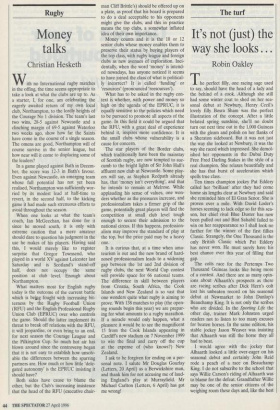Rugby
Money talks
Christian Hesketh
In a game played against Bath in Decem- ber, the score was 12-3 in Bath's favour. Even against Newcastle, an emerging team whose full potential has not yet been realised, Northampton was sufficiently wor- ried by its modest lead at half-time to revert, in the second half, to the kicking game it had made such strenuous efforts to avoid throughout the season.
When one looks at what the team's coach, Ian McGeechan, has done for it since he moved south, it is only with extreme caution that a mere amateur should dare to question his judgment in the use he makes of his players. Having said this, I would merely like to register surprise that Gregor Townsend, who played in a world XV against Leicester last Saturday and is Scotland's stand-off half, does not occupy the same position at club level. Enough about Northampton.
What matters most for English rugby today is the outcome of the current battle which is beitig fought with increasing bit- terness by the Rugby Football Union (RFU) and the English Professional Rugby Union Club (EPRUC) over who controls the game. Should the latter implement its threat to break off relations with the RFU, it will jeopardise, or even bring to an end, for next season the Courage League and the Pilkington Cup. So much hot air has blown around since the controversy began that it is not easy to establish how unsolv- able the differences between the sparring partners are. How much or how little 'dele- gated autonomy' is the EPRUC insisting it should have?
Both sides have cause to blame the other, but the Club's increasing insistence that the head of the RFU (executive chair- man Cliff Brittle's) should be offered up on a plate, as proof that his board is prepared to do a deal acceptable to his opponents might give the clubs, and this in practice means the top clubs, a somewhat inflated idea of their own importance.
Money counts and it is the 10 or 12 senior clubs whose money enables them to preserve their status by buying players of the top class, with rugby league and foreign clubs as new avenues of exploration. Inci- dentally, when the word 'money' is intend- ed nowadays, has anyone noticed it seems to have joined the class of what is political- ly incorrect? It is called 'funding' or `resources' (pronounced `reesources').
What has to be asked in the rugby con- text is whether, with power and money so high on the agenda of the EPRUC, it is equally sensitive to the policies which need to be pursued to promote all aspects of the game. In this field it could be argued that the RFU, with a great deal of experience behind it, inspires more confidence. It is the small clubs whose vulnerability is a cause for concern.
The star players of the Border clubs, which traditionally have been the mainstay of Scottish rugby, are now tempted to suc- cumb to the bright lights of Sir John Hall's affluent new club at Newcastle. Some play- ers will say, as Stephen Redpath already has, that 'money isn't everything', and that he intends to remain at Melrose. While applauding his sense of values, one won- ders whether as the pressures increase, and professionalism takes a firmer grip of the game, potentially great players will find the competition at small club level tough enough to secure their admission to the national circus. If this happens, profession- alism may improve the standard of play at the top, but the price paid may be a heavy one.
It is curious that, at a time when ama- teurism is out and the new brand of hard- nosed professionalism leads to a widening gap between the 1st and 2nd division of rugby clubs, the next World Cup contest will provide space for 66 national teams. The difference in skill between players from Croatia, South Africa, the Cook Islands and New Zealand is so vast that one wonders quite what rugby is aiming to prove. With 138 matches to play (the open- ing rounds begin this year) we are prepar- ing for what amounts to a rugby marathon. If a miracle would only happen, what a pleasure it would be to see the magnificent 15 from the Cook Islands appearing in Cardiff's new stadium on 7 November 1999 to win the final and carry off the cup at the expense of (who knows?) New Zealand.
I ask to be forgiven for ending on a per- sonal note. I salute Mr Douglas Gourlay (Letters, 20 April) as a Berwickshire man, and thank him for not accusing me of laud- ing England's play at Murrayfield. Mr Michael Carlton (Letters, 6 April) has got me wrong!


























































 Previous page
Previous page